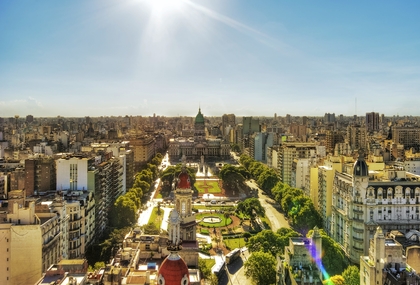Buenos Aires
Updated:
7 Sep 2020
Buenos Aires (or ) is the capital and largest city of Argentina. The city is located on the western shore of the estuary of the Río de la Plata, on the South American continent's southeastern coast. "Buenos Aires" can be translated as "fair winds" or "good airs", but the former was the meaning intended by the founders in the 16th century, by the use of the original name "Real de Nuestra Señora Santa María del Buen Ayre", named after the Madonna of Bonaria in Sardinia. The Greater Buenos Aires conurbation, which also includes several Buenos Aires Province districts, constitutes the fourth-most populous metropolitan area in the Americas, with a population of around 15.6 million. The city of Buenos Aires is neither part of Buenos Aires Province nor the Province's capital; rather, it is an autonomous district. In 1880, after decades of political infighting, Buenos Aires was federalized and removed from Buenos Aires Province. The city limits were enlarged to include the towns of Belgrano and Flores; both are now neighborhoods of the city. The 1994 constitutional amendment granted the city autonomy, hence its formal name of Autonomous City of Buenos Aires (Ciudad Autónoma de Buenos Aires; "CABA"). Its citizens first elected a chief of government (i.e. mayor) in 1996; previously, the mayor was directly appointed by the President of the Republic. Buenos Aires' quality of life was ranked 91st in the world in 2018, being one of the best in Latin America. In 2012, it was the most visited city in South America, and the second-most visited city of Latin America (behind Mexico City). Buenos is known for its preserved Eclectic European architecture and rich cultural life. Buenos Aires held the 1st Pan American Games in 1951 as well as hosting two venues in the 1978 FIFA World Cup. Buenos Aires hosted the 2018 Summer Youth Olympics and the 2018 G20 summit. Buenos Aires is a multicultural city, being home to multiple ethnic and religious groups. Several languages are spoken in the city in addition to Spanish, contributing to its culture and the dialect spoken in the city and in some other parts of the country. This is because in the last 151 years the city, and the country in general, has been a major recipient of millions of immigrants from all over the world, making it a melting pot where several ethnic groups live together and being considered one of the most diverse cities of the Americas.




